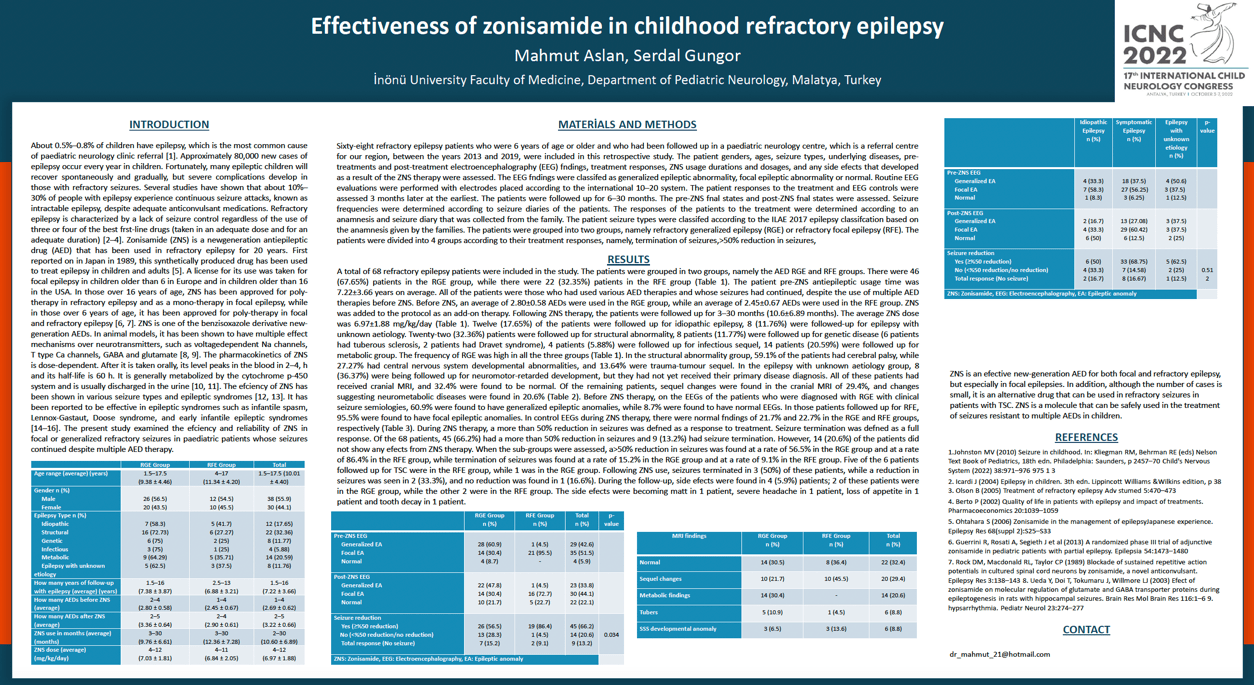Effectiveness of zonisamide in childhood refractory epilepsy
Mahmut Aslan, Serdal Gungor
Introduction: Zonisamide (ZNS) is a new generation antiepileptic drug (AED) used in refractory epilepsy. This study assessed the effectiveness and reliability of ZNS in childhood refractory epilepsy. Method: Sixty-eight epilepsy patients who were followed up in the paediatric neurology clinic, between 2013 and 2019, and in whom add-on therapy ZNS had been added as their seizures had continued despite multiple drugs being used, were included in this retrospective study. Results: There were 46 (67.6%) patients in the refractory generalized epilepsy (RGE) group using multiple AEDs and 22 (32.35%) patients in the refractory focal epilepsy (RFE) group. In the RFE group, a more than 50% reduction was found in the seizures of 26 (56.5%) patients, while the seizures of 7 (15.2%) patients were found to have terminated completely. In the RFE group, a more than 50% reduction was found in the seizures of 19 (86.4%) patients, while the seizures of 2 (9.1%) patients were found to have terminated completely. The termination or a more than 50% reduction in seizures in 4 of the 6 patients followed up for a diagnosis of tuberous sclerosis complex (TSC) was significant. Conclusion: ZNS is an effective and reliable option as an add-on therapy in paediatric refractory epilepsy, especially in focal epilepsy. It can also be considered for treatment in TSC patients. Keywords: Children; EEG; Refractory epilepsy; Zonisamide.
Keywords: Children; EEG; Refractory epilepsy; Zonisamide.
Mahmut Aslan
Turkey
Serdal Gungor
Turkey
Introduction: Zonisamide (ZNS) is a new generation antiepileptic drug (AED) used in refractory epilepsy. This study assessed the effectiveness and reliability of ZNS in childhood refractory epilepsy. Method: Sixty-eight epilepsy patients who were followed up in the paediatric neurology clinic, between 2013 and 2019, and in whom add-on therapy ZNS had been added as their seizures had continued despite multiple drugs being used, were included in this retrospective study. Results: There were 46 (67.6%) patients in the refractory generalized epilepsy (RGE) group using multiple AEDs and 22 (32.35%) patients in the refractory focal epilepsy (RFE) group. In the RFE group, a more than 50% reduction was found in the seizures of 26 (56.5%) patients, while the seizures of 7 (15.2%) patients were found to have terminated completely. In the RFE group, a more than 50% reduction was found in the seizures of 19 (86.4%) patients, while the seizures of 2 (9.1%) patients were found to have terminated completely. The termination or a more than 50% reduction in seizures in 4 of the 6 patients followed up for a diagnosis of tuberous sclerosis complex (TSC) was significant. Conclusion: ZNS is an effective and reliable option as an add-on therapy in paediatric refractory epilepsy, especially in focal epilepsy. It can also be considered for treatment in TSC patients. Keywords: Children; EEG; Refractory epilepsy; Zonisamide.
Keywords: Children; EEG; Refractory epilepsy; Zonisamide.
Mahmut Aslan
Turkey
Serdal Gungor
Turkey

Mahmut Aslan
Turkey
Turkey